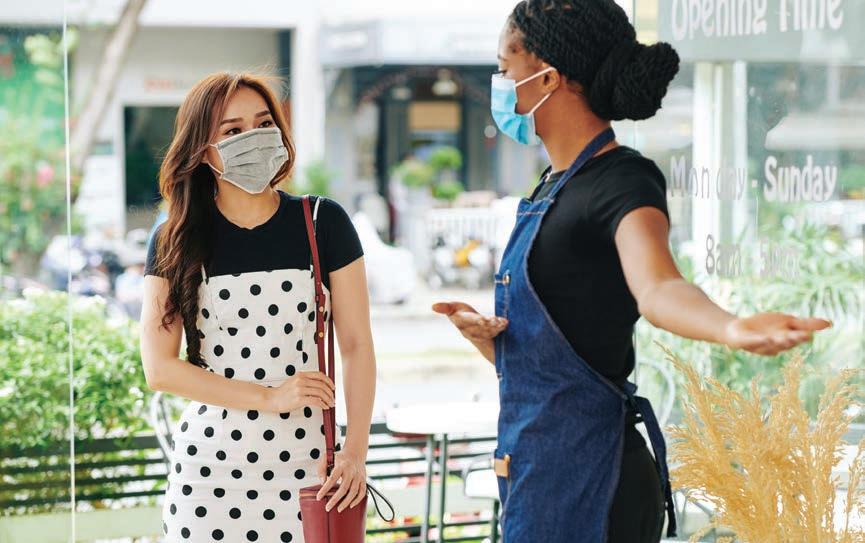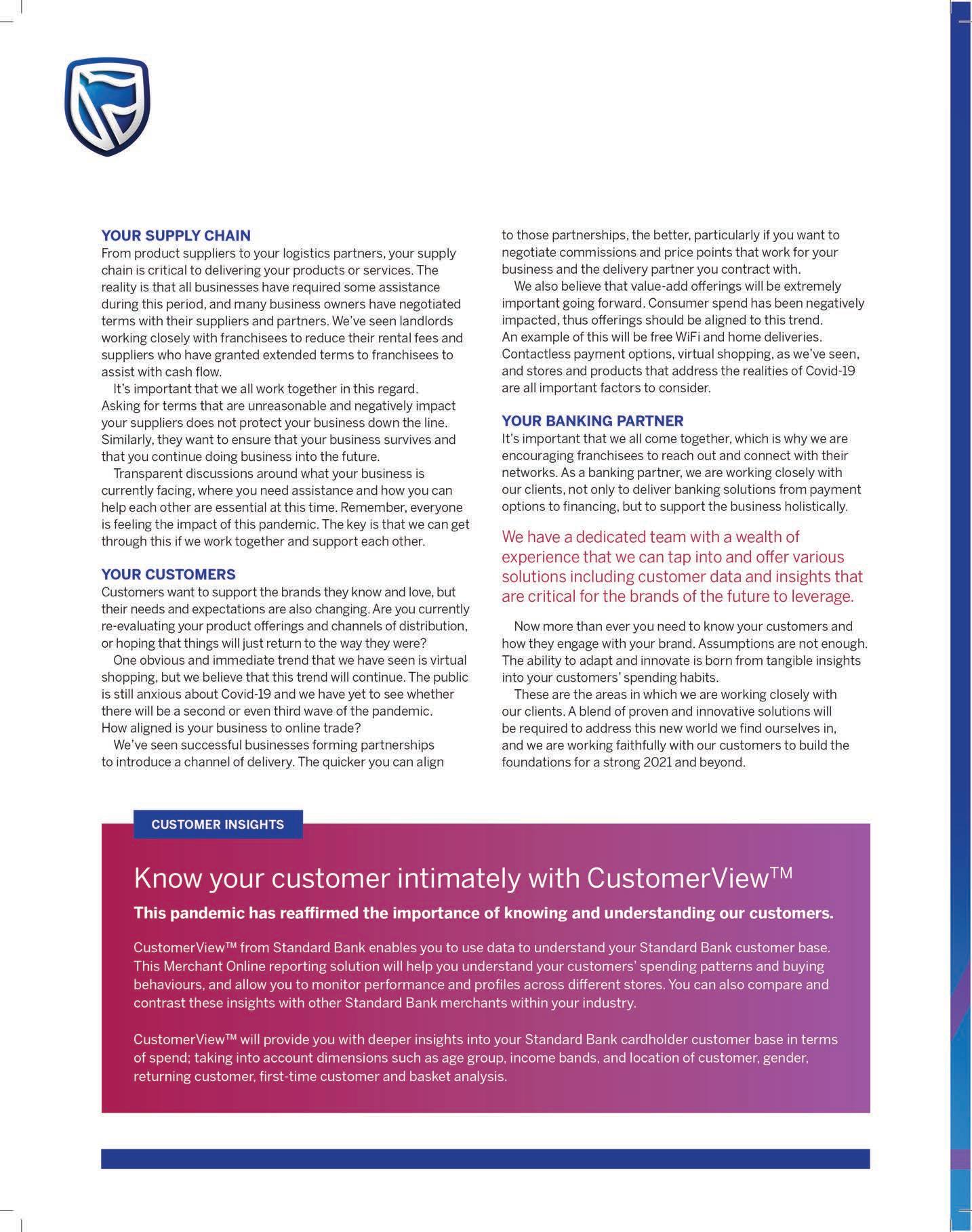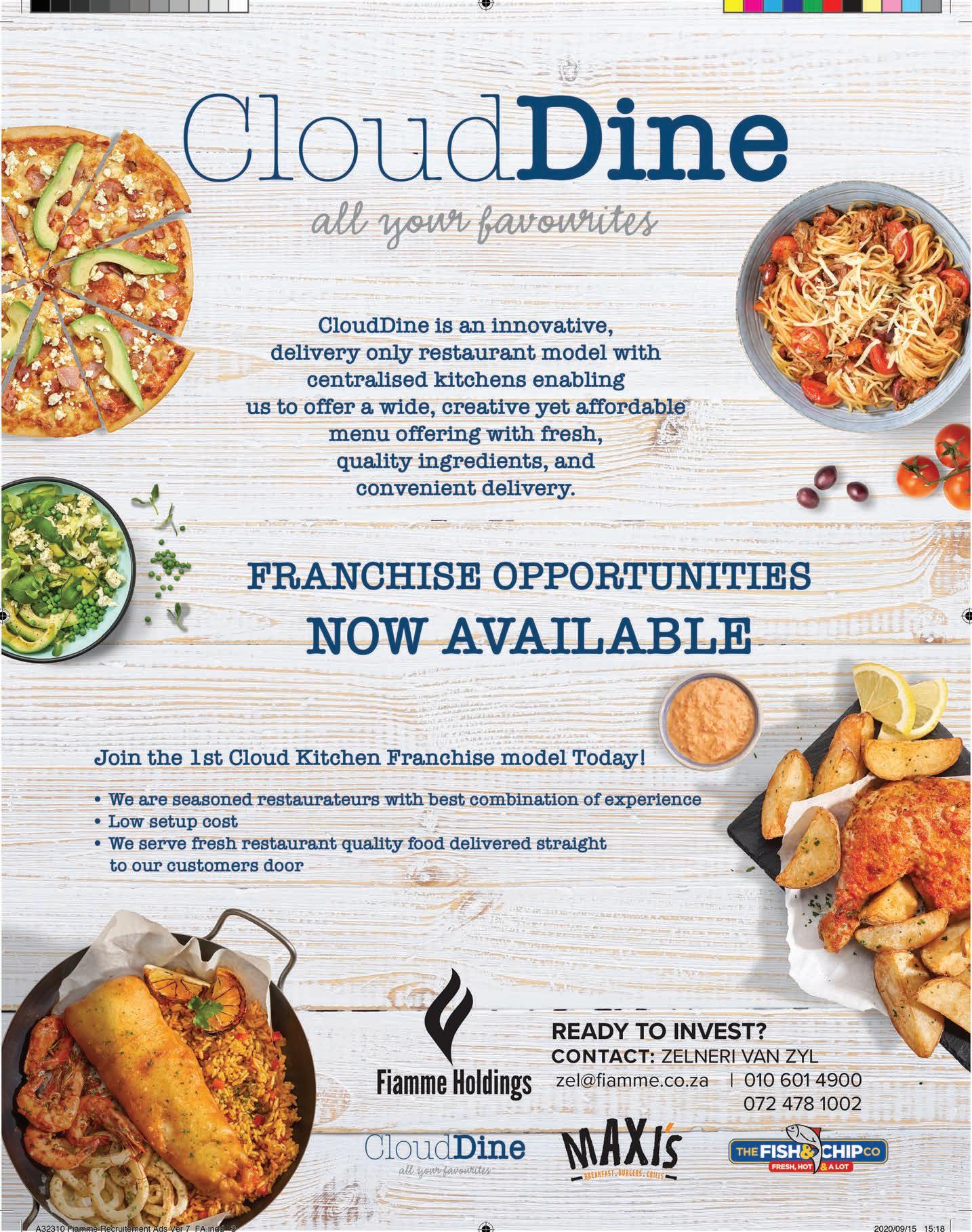
17 minute read
THE FRANCHISE ASSOCIATION OF SOUTH AFRICA
FRANCHISING LOOKS TO THE FUTURE
Can the fl ame of entrepreneurship be reignited? By AKHONA QENGQE, chairperson of the Franchise Association of South Africa
Franchising has at its heart the spirit of entrepreneurship, but amid the COVID-19 pandemic, the question is if the entrepreneurial fl ame can be reignited for future growth.
The franchise sector, which in South Africa is represented in around 14 different business sectors, posted an estimated turnover of R734-billion in 2019, equivalent to 13 per cent of GDP. It has over 800 franchise systems operating through 48 000 outlets and employing close to 500 000 people – representing the highest and most diverse range of entrepreneurial endeavours. The sector is the most suited to lead the post-COVID recovery.
Tapping into the wave of innovation that change will no doubt bring about – from online trading and innovative robotics to a new wave of ethical consumerism and global activism, mobilising creative and innovative responses, seeing the gaps in the market, and redesigning and re-engineering for the future – is what entrepreneurs all over the world will focus on. And where there are entrepreneurs ... there are franchisors and franchisees.
Despite the doom and gloom of our current health and economic situation, the board of the Franchise Association of South Africa (FASA), in its dealings with members of the association, has concluded that “we wager that the franchise industry will make a faster
and better recovery post-COVID than most other business categories”.
Listening to franchisors and how they have quickly jumped in to assist their franchisees during the COVID-19 crisis can only stand the sector in good stead as it forges ahead to recover and rebuild.
The success of franchising is largely due to the following guiding principles. • Individual business owners simply do not have the network expertise that they can tap into like a franchised system. Nor do they have, for example, the marketing expertise, a wider business view and knowledge of how others have tackled problems and found solutions. • The ability to augment their business model quickly, interpret consumer behaviour, identify problems and recognise how to solve them. • Franchisors tap into technology and use the information they glean from their systems to benchmark the way forward for the business. They analyse customer trends, growth spots, declining products and services, reasons for the change in consumer behaviour, and how to adapt products and services to the ever-changing needs of their customers quickly – crucial for the survival of businesses today.
“Listening to franchisors and how they have quickly jumped in to assist their franchisees during the COVID-19 crisis can only stand the sector in good stead as it forges ahead to recover and rebuild.” – Akhona Qengqe, CHAIRPERSON, FASA
• Even if individual- or family-owned business owners belong to small business networks or other industry bodies, these organisations – although they offer help and assistance – will never have the intimate knowledge and understanding of their business models that a franchisor and fellow franchisees have. • Franchisors and franchisees not only have access to the business minds within their brand, but also across similar business categories in the franchise business sector as well as the broader franchise industry. • Franchises, in general, are far more nimble, adaptable and quick to market with clever and real solutions than individuals or freestanding business owners.
800 Franchise systems 48 000 Outlets 500 000 Personnel
FASA hopes that franchising’s sound principles will instil confi dence in the business sector for development funders, banks, landlords and other stakeholders to play their part in the sector’s recovery. The banking fraternity has a huge responsibility to acknowledge the unique benefi ts of franchising as well as the sector’s successful track record and how they have benefi ted from this sector over the years. Now they need to come up with funding solutions that are less risk-averse, with simple application processes that can stimulate growth for franchisors by way of rapid distribution growth. This, in turn, would create jobs and stimulate disposable income.
Never underestimate a tough and resilient franchise industry full of talented and highly motivated people who excel during times of extreme stress and undue pressure. Their innovative thinking and unrelenting desire for success will help kick-start the South African economy, and get the wheels of job creation and consumerism steaming ahead.
Akhona Qengqe
LEADERSHIP LESSONS LEARNT IN A CRISIS



Franchise leaders have been sharing their experiences in trying to confront and manage the challenges of COVID-19, writes TONY DA FONSECA, MD of the OBC Group and immediate past chairman of the Franchise Association of South Africa
Franchise leaders around the world all agree that the very nature of franchising as a business not only calls for continual innovation, but also relies on the combined efforts of both franchisor and franchisee. This, it seems, could be franchising’s saving grace.
Franchising is represented by the strength of the collective and highlights the importance of partnerships, which, if harnessed in the right way, can help us overcome this crisis.
It has forced us, as a collective, to relook new channels and new ways of doing business, accelerate plans for introducing new products and services, and change our media and customer strategies. We have always known that the franchise business format works in good times. Now we must all prove that it will also work during the challenging times. I believe franchising can do this and that we will bounce back stronger from this.
In the case of COVID-19, franchises never experienced anything of this magnitude before, nor had time to prepare for it. Now, they face new leadership challenges every day to steer their franchisees through the ruins to recovery. Franchisors share the following valuable lessons through the International Franchise Association.
Tony da Fonseca

HANDLING THE TOUGH QUESTIONS
Even though the unknown brings with it many unanswered questions, don’t shy away from being brutal in assessing the business, where it’s at and where it is going. Of primary importance is the protection of your staff and customers under the health regulations. A franchisor needs to analyse the fi nancial state of the business carefully – both for the franchisor as the
“Franchising is represented by the strength of the collective and highlights the importance of partnerships.” – Tony da Fonseca, former chairperson, FASA DID YOU KNOW? Minuteman Press International has launched a new initiative, Bounce Back South Africa, to help give back to businesses in local communities that have been hit hard by the COVID-19 pandemic. The initiative is available right now, free to business owners.
Source: FASA
principal and for the franchisees that are operating. Investigating avenues to reorganise, reinvigorate and reset the business must be the priority.
LISTEN AND COMMUNICATE
While a franchisor may not be in a position to ensure the way forward, it is important always to answer stakeholders’ questions almost before they even ask them.
More importantly, put yourself in the shoes of your stakeholders – whether they are your franchisors, your suppliers, or your customers – and recognise their challenges and fears. Then assure them that, as a collective with everyone playing their part, there is hope and a way to forge a viable recovery.
BE TRANSPARENT WITH ALL STAKEHOLDERS
Face your challenges head-on and address the hard issues with all stakeholders. Above all else, maintain the trust you have built up with your franchisees and stakeholders.
This may mean being brutally honest and not side-stepping the important issues that affect everyone. Addressing challenges headon, assessing the situation currently facing every aspect of the business and then fi nding workable solutions going forward will address the negative, allay fears, and take the next steps collectively.
TAP INTO PEER FRANCHISE NETWORKS
The franchise community and especially those that are members of FASA all subscribe to a code of ethics and share common values. In times of crisis, use this core group of peers as sounding boards to help when diffi cult decisions must be made.
Other franchisors might operate in different business sectors, but they all share the same franchise principles and have all been affected by COVID-19. Arrange virtual meetings with fellow franchisors to discuss common challenges, explore new tactics and gain fresh perspectives on how to move forward.
There is no question that franchising – with its tried and tested business format, and its principle of duplication and network support - is in a far better position to weather the COVID-19 pandemic, pick up the pieces and emerge stronger than ever.
COLLABORATION THE NAME OF THE GAME
Strong franchisor-franchisee relationships are key to the success of the franchise system, writes EUGENE HONEY, legal advisor, Franchise Association of South Africa

franchisee is of the utmost importance, more so in these trying times. Now there is greater pressure on franchisors to up the level of communication and engagement with franchisees to ensure that as a group they weather the storm together and come out relatively unscathed and stronger for having worked together. As one franchisor said: “We’re all in this together. It is in all our interests – as franchisors, franchisees and suppliers – to work together for our ultimate survival.”
The very nature of franchising as a collaborative business structure lies at the core of franchising’s success. The adage in franchising that you cannot have a successful franchisor without successful franchisees will sort the wheat from the chaff. And, those franchise companies that work together to fight and overcome the challenges will come out stronger.
THE IMPORTANCE OF BEING A FASA MEMBER
The franchise sector has not been spared during this pandemic and many fledgling franchise brands may not survive these hard times, or they may be faced with survival challenges or disputes with their franchisees. But, thanks to their business structure of duplication, strong support and a culture of working together, most established franchised brands have fared far better than independent businesses.
It is especially in these hard times that franchise businesses need the support of an industry representative that can guide them, act on their behalf, lobby government and ensure the stability, protection and recovery of this important sector, which in 2019 contributed close to 13 per cent to the country’s GDP.
For many years, FASA identified the need in the South African franchise industry for an effective, alternative dispute resolution process. The intention is to provide both franchisors and franchisees with an opportunity to resolve disputes between them in a consistent, effective and efficient manner.
FASA worked closely with government to develop and refine a new Franchise Industry Code, which includes a robust mediation process, additional provisions aimed at regulating behaviour within the industry and providing for certain matters not dealt with by the Consumer Protection Act (CPA).
Until the Franchise Industry Code is adopted and an ombudsman appointed, and due to the nature of franchising and the often tenuous relationship between franchisor and franchisee, FASA affords its members free mediation services as part of
The relationship between franchisor and
its membership fee.
DID YOU KNOW? You can browse the FASA franchise directory for accredited franchises for sale in South Africa, Africa and globally.
As membership to FASA is voluntary, many new franchise brands believe that they don’t need to be members. They proceed to run their businesses as they see fit – until they encounter legal disputes with their franchisees or statutory problems for being noncompliant with the requirements of the CPA, which has a section specific to franchising.
Had those franchise brands been members of FASA, their disclosure documents would have been compliant as the association, on application, ensures that a franchisor’s documents are all fully in line with the regulations of the CPA. And, if they needed help and assistance by way of a mediation session, as a member this would be offered free of charge.
Now, more than ever, with an industry code in the pipeline, all franchise businesses should become members of FASA to get the backing and credibility stamp from the industry’s only representative body. This will provide them and all potential and existing franchisees with peace of mind.
The best advice to anyone looking to buy a franchise is to ensure that the franchise they are buying into is a member of FASA.
TURNING THE FRANCHISE BUSINESS
BACK ON By learning from the experience of franchisors globally, the business is regrouping and adapting, reports the Franchise Association of South Africa


Globally, we have been living in unprecedented times these past six months, facing a future that looks shaky and uncertain at best. Never before has any business experienced having to stop their activities completely, and then turn an entire system back on. Due to its unique business format, franchising was able, in many cases, to modify its business models to stay afl oat, draw on combined talent and resources, and regroup to look to the future. Here are some of the critical lessons gleaned from franchisors.
ADAPTABILITY IS KEY
Traditionally, the franchise industry has successfully weathered diffi cult economic times, with adaptability being a primary aspect of its DNA. When a crisis occurs, the franchisor is already looking at how it can adapt so its franchisees can keep moving forward. That is the beauty of “the collective” made up of franchisors and franchisees who, in times of crisis, come together to tackle the challenges, fi nd solutions and forge a new path.
A good example is those sectors that turned to online trade and home deliveries to keep their businesses going until they were able to resume full services. Others accelerated plans for new products and services to fi ll customer needs.
NO ONE-SIZE-FITS-ALL SOLUTION
There is no one-size-fi ts-all solution for reopening franchise systems post-COVID-19. With FASA Logo franchises in around 14 different business categories in South Africa, the challenges facing franchisors varies – impacted by the regulations, its sector, the size of the franchise group, its maturity, business culture and most importantly its leadership.
Those franchisors who got involved in fi nding solutions – from easing the royalty responsibilities to negotiating with landlords and suppliers – will be the ones to emerge stronger. A franchise brand’s track record and reputation will no doubt stand them in good stead as they navigate getting back on their feet again.
SURVIVAL OF THE FITTEST
This pandemic will prove to be the test that separates the men from the boys. Those franchisors that set up solid, ethical operations with good systems and had a strong culture of franchisor-franchisee relations will be able to work their way back to profi tability.
Those that chose not to abide by franchising’s stringent business practices as prescribed globally and by the Franchise Association of South Africa (FASA), and ran dubious operations could see the demise of their franchise brands. Compared to independent, stand-alone businesses hard hit by the lockdown, franchised businesses, due to the very nature of the franchise format of partnership with strong support systems in place, fared far better.
REWRITING THE RULE BOOK
With franchising so reliant on hard and fast franchise agreements and stringent operation manuals, the pandemic certainly threw a curveball in terms of how to deal with system closures and the restarting and reshaping of a franchise system. While there will have to be some restructuring, good business judgement and good communication will make for a stronger and more resilient franchise industry.
Now more than ever, the role of FASA is crucial in bringing together franchise brands to analyse the impact of the pandemic, to band together to lobby government for assistance in rebuilding the economy and to re-establish the sector as an important contributor to the country’s GDP.
Both FASA’s current chairperson, Akhona Qengqe of KFC, and immediate past chairman, Tony da Fonseca of the OBC Group, agree that it is in times of crisis that the franchise model is tested. Those with a strong, resilient structure and healthy franchisor-franchisee partnerships will survive and go on to prosper and become even stronger.
3 | FASA | FASA & IFE Brand Principles Guideline | May 2015
For more information:
Phone: +27 11 615 0359 Email: enquiries@fasa.co.za Website: www.fasa.co.za
Prepared by Worx Group




ADAPTING TO CHANGE
Valuable lessons from the Covid-19 pandemic
Facing a global pandemic not only pulls communities together, it teaches us valuable business and life skills. Standard Bank’s Head of Franchising, André Beck, shares his insights into what we can learn from Covid-19 to build better businesses for the future.

The Covid-19 pandemic has been devastating to many businesses in the hardest hit sectors. In your view, will there be any positive outcomes?
Business owners have seen that their businesses do not survive in isolation. They are inextricably linked to the economy, their communities, their employees and each other, which means we need to work together, support each other and do what’s best for the entire community – not just individual balance sheets.
Many businesses have always operated like this, but I believe there will be an uptick in overall reasonable and ethical practices, particularly towards employees, as a result of what we have collectively experienced in 2020.
How has the pandemic created new cultures within businesses?
Franchisees used to wait for their franchise managers to visit them before addressing challenges or concerns, but these are now handled immediately. We are closer than ever to our clients for the same reason. We can log onto our systems and instantly reach colleagues, clients or other members of our networks, and it’s not only made us more empathetic and collaborative, but we’re finding incredible solutions to the problems we’re collectively facing as a result of the pandemic.
What is the single most important quality a business should embrace right now?
Adaptability. There are many aspects businesses should be focusing on, but they all come down to this trait: How quickly can you adapt your business model, products and service offerings based on new insights, data, operating conditions and customer expectations?
A high adaptability quotient is critical to sustainability and success in a post-Covid-19 world.
What are the biggest sector trends you have noticed as a result of the pandemic?
There has been a fundamental shift in every industry. For example, many quick service restaurants are opening ‘dark kitchens’. These are also known as ghost kitchens, cloud kitchens or virtual kitchens. They refer to central kitchens where orders are placed, cooked and then collected for delivery. The result is a larger focus on deliveries instead of customers coming into stores, smaller stores and lower rentals – all while catering to new customer demands.
There has also been a significant uptake in e-commerce and online retail solutions. This covers 3D virtual tours and selections that support customer experiences through virtual platforms, as well as partnering with delivery companies to offer online ordering and deliveries.
We’ve also seen brands investing in apps that support overall customer experiences. For example, imagine an app that allows a customer to order a cappuccino from their car while filling up with fuel, ensuring limited in-person contact. Our clients are increasingly investigating our contactless payment solutions, which highlights this shift in consumer behaviour.
Business owners have realised that it’s more important than ever to know who their customers are and what they need. How does this impact on-theground decisions for franchisees?
Every day businesses generate hundreds – even thousands –











